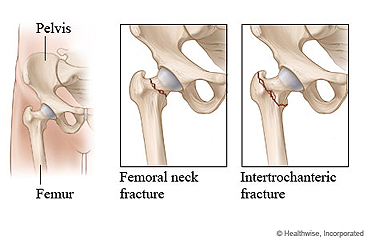
What is surgery to repair a hip fracture?
Surgery for a hip fracture repairs a broken hip bone. Broken hips are often caused by a fall or other injury. Some kinds of broken bones heal on their own in a cast. But a broken hip is not likely to heal well without surgery.
Doctors usually use general anesthesia for hip fracture surgeries, which means you'll be asleep during surgery. But sometimes they use regional anesthesia, which means you can't feel the area of the surgery and you are sleepy but awake. The choice depends on what you and your doctor decide based on your overall health.
The doctor makes one or two cuts over the broken bone in your hip. These cuts are called incisions. Then the doctor moves the pieces of bone back into the right position. The doctor uses metal pins, screws, rods, or plates to hold the pieces together while the bone heals. During the surgery, the doctor may use X-rays to see if the pins and plate are in the correct place. After the pieces of bone are lined up, the doctor stitches or staples the incision closed. The incisions leave scars that fade with time.
You will probably stay in the hospital for 2 to 4 days. Your rehabilitation program (rehab) starts when you are still in the hospital. It continues for 6 months or more after surgery. It will take at least 3 months before you can go back to your regular activities. How much time you need will depend on your condition and rehab program.
If you don't have someone to help you at home, you may go from the hospital to a short-term rehabilitation center or a long-term care center. For several months, you may need the help of a walker or crutches. After that, you may need to walk with a cane.
Rehab can help you recover more quickly, but it may take 6 months to 1 year for you to fully recover. Some people, especially older people, are never able to move quite as well as they used to. Most people can go back to work in 4 weeks to 4 months. This depends on your condition and the type of job you have.
How do you prepare for surgery?
Surgery can be stressful. This information will help you understand what you can expect. And it will help you safely prepare for surgery.
 Preparing for surgery
Preparing for surgery
- You may need to shower or bathe with a special soap the night before and the morning of your surgery. The soap contains chlorhexidine. It reduces the amount of bacteria on your skin that could cause an infection after surgery.
- Be sure you have someone to take you home. Anesthesia and pain medicine will make it unsafe for you to drive or get home on your own.
- Understand exactly what surgery is planned, along with the risks, benefits, and other options.
- If you take a medicine that prevents blood clots, your doctor may tell you to stop taking it before your surgery. Or your doctor may tell you to keep taking it. (These medicines include aspirin and other blood thinners.) Make sure that you understand exactly what your doctor wants you to do.
- Tell your doctor ALL the medicines, vitamins, supplements, and herbal remedies you take. Some may increase the risk of problems during your surgery. Your doctor will tell you if you should stop taking any of them before the surgery and how soon to do it.
- Make sure your doctor and the hospital have a copy of your advance directive. If you don't have one, you may want to prepare one. It lets others know your health care wishes. It's a good thing to have before any type of surgery or procedure.
What happens on the day of surgery?
-
Follow the instructions exactly about when to stop eating and drinking. If you don't, your surgery may be canceled. If your doctor told you to take your medicines on the day of surgery, take them with only a sip of water.
-
Take a bath or shower before you come in for your surgery. Do not apply lotions, perfumes, deodorants, or nail polish.
-
Do not shave the surgical site yourself.
-
Take off all jewelry and piercings. And take out contact lenses, if you wear them.
At the hospital or surgery center
-
Bring a picture ID.
-
The area for surgery is often marked to make sure there are no errors.
-
You will be kept comfortable and safe by your anesthesia provider. The anesthesia may make you sleep. Or it may just numb the area being worked on.
-
The surgery will take 2 to 4 hours.
When should you call your doctor?
- You have questions or concerns.
- You don't understand how to prepare for your surgery.
- You become ill before the surgery (such as fever, flu, or a cold).
- You need to reschedule or have changed your mind about having the surgery.
Where can you learn more?
Go to http://www.healthwise.net/patientEd
Enter Y640 in the search box to learn more about "Surgery to Repair a Hip Fracture: Before Your Surgery".
Current as of: July 31, 2024
Author: Ignite Healthwise, LLC Staff
Clinical Review Board
All Healthwise education is reviewed by a team that includes physicians, nurses, advanced practitioners, registered dieticians, and other healthcare professionals.

